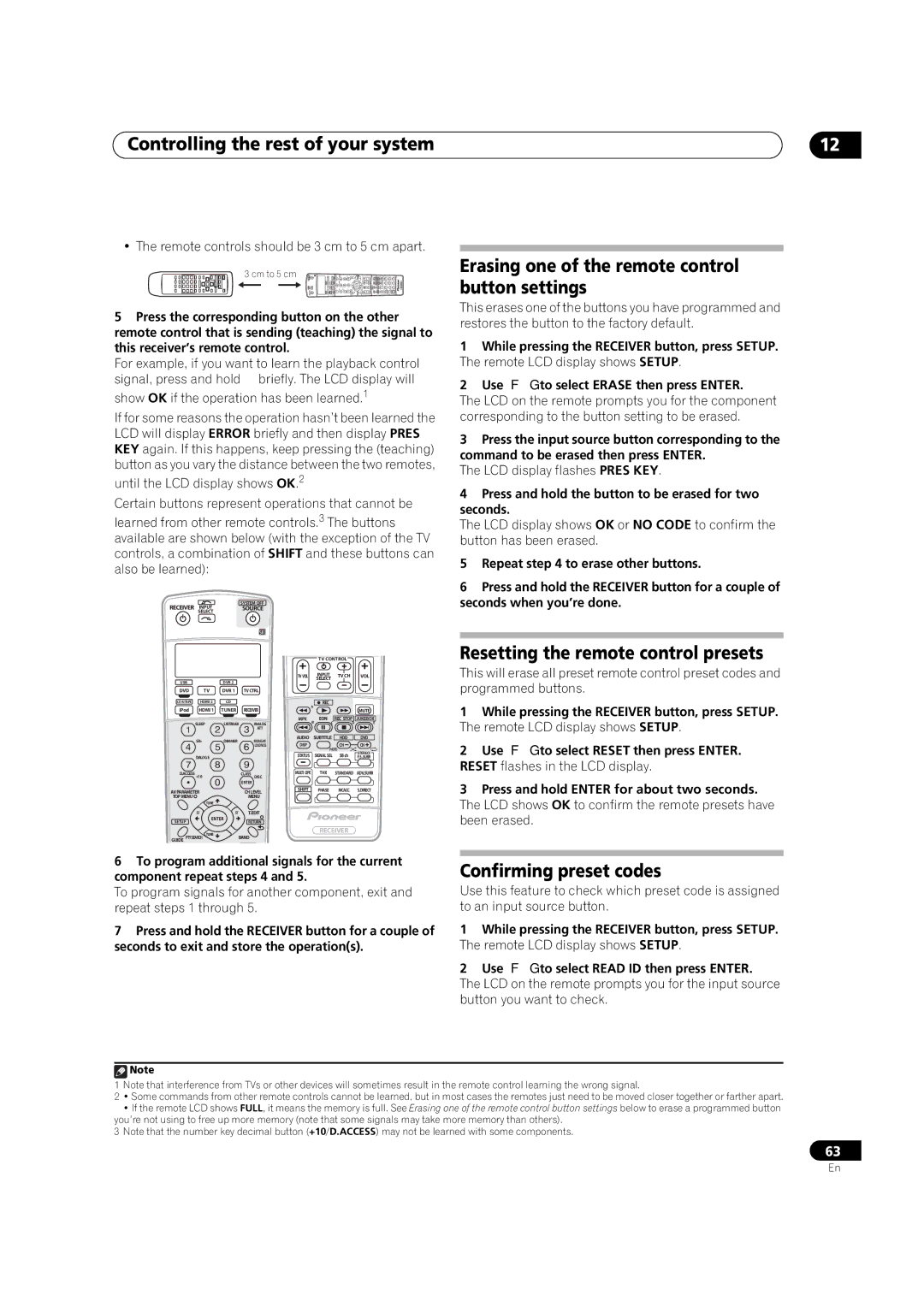
Controlling the rest of your system
• The remote controls should be 3 cm to 5 cm apart.
3 cm to 5 cm
5Press the corresponding button on the other remote control that is sending (teaching) the signal to this receiver’s remote control.
For example, if you want to learn the playback control signal, press and hold briefly. The LCD display will show OK if the operation has been learned.1
If for some reasons the operation hasn’t been learned the LCD will display ERROR briefly and then display PRES KEY again. If this happens, keep pressing the (teaching) button as you vary the distance between the two remotes,
until the LCD display shows OK.2
Certain buttons represent operations that cannot be
learned from other remote controls.3 The buttons available are shown below (with the exception of the TV controls, a combination of SHIFT and these buttons can also be learned):
RECEIVER | INPUT |
| SYSTEM OFF |
|
|
|
|
|
| SOURCE |
|
|
|
|
| ||
| SELECT |
|
|
|
|
|
|
|
|
|
|
|
|
| TV CONTROL |
| |
|
|
|
| TVVOL |
| INPUT | TVCH | VOL |
USB |
| DVR 2 |
|
|
| SELECT |
|
|
DVD | TV | DVR 1 | TVCTRL |
|
|
|
|
|
HDMI 2 | CD |
|
| A | REC |
|
| |
iPod | HDMI 1 | TUNER | RECEIVER |
|
|
| MUTE | |
|
|
|
| |||||
|
|
|
| MPX | B | EON | REC STOP | JUKEBOX |
| SLEEP | S.RETRIEVER | ANALOG |
| C | D | E | |
|
|
| ATT |
|
|
|
|
|
| SR+ | DIMMER | MIDNIGHT/ | AUDIO | SUBTITLE | HDD | DVD | |
| DISP |
|
| CH | CH | |||
|
|
| LOUDNESS |
|
| |||
|
|
|
|
|
| PHOTO | STEREO/ | |
|
|
|
| STATUS |
| SIGNAL SEL | SBch | |
| DIALOG E |
|
|
| F.S.SURR | |||
D.ACCESS +10 |
| CLASS DISC | MULTI OPE |
| THX | STANDARD | ADV.SURR | |
|
|
| ENTER |
|
|
|
|
|
AVPARAMETER |
| CHLEVEL | SHIFT |
| PHASE | MCACC | S.DIRECT | |
TOPMENU |
|
| MENU |
|
|
|
|
|
| TUNE |
|
|
|
|
|
|
|
| ST | ST | T.EDIT |
|
|
|
|
|
SETUP | ENTER | RETURN |
|
|
|
|
| |
|
|
|
|
|
|
| ||
GUIDE PTYSEARCH TUNE |
|
|
|
| RECEIVER |
| ||
BAND |
|
|
|
|
| |||
12
Erasing one of the remote control button settings
This erases one of the buttons you have programmed and restores the button to the factory default.
1While pressing the RECEIVER button, press SETUP. The remote LCD display shows SETUP.
2Use / to select ERASE then press ENTER.
The LCD on the remote prompts you for the component corresponding to the button setting to be erased.
3Press the input source button corresponding to the command to be erased then press ENTER.
The LCD display flashes PRES KEY.
4Press and hold the button to be erased for two seconds.
The LCD display shows OK or NO CODE to confirm the button has been erased.
5Repeat step 4 to erase other buttons.
6Press and hold the RECEIVER button for a couple of seconds when you’re done.
Resetting the remote control presets
This will erase all preset remote control preset codes and programmed buttons.
1While pressing the RECEIVER button, press SETUP. The remote LCD display shows SETUP.
2Use / to select RESET then press ENTER. RESET flashes in the LCD display.
3Press and hold ENTER for about two seconds. The LCD shows OK to confirm the remote presets have been erased.
6To program additional signals for the current component repeat steps 4 and 5.
To program signals for another component, exit and repeat steps 1 through 5.
7Press and hold the RECEIVER button for a couple of seconds to exit and store the operation(s).
Confirming preset codes
Use this feature to check which preset code is assigned to an input source button.
1While pressing the RECEIVER button, press SETUP. The remote LCD display shows SETUP.
2Use / to select READ ID then press ENTER.
The LCD on the remote prompts you for the input source button you want to check.
![]() Note
Note
1Note that interference from TVs or other devices will sometimes result in the remote control learning the wrong signal.
2• Some commands from other remote controls cannot be learned, but in most cases the remotes just need to be moved closer together or farther apart.
•If the remote LCD shows FULL, it means the memory is full. See Erasing one of the remote control button settings below to erase a programmed button you’re not using to free up more memory (note that some signals may take more memory than others).
3Note that the number key decimal button (+10/D.ACCESS) may not be learned with some components.
63
En
